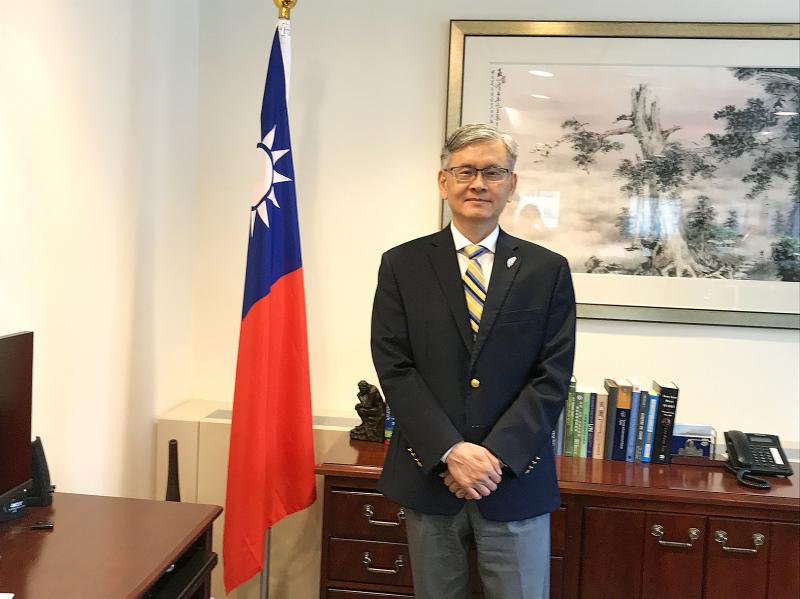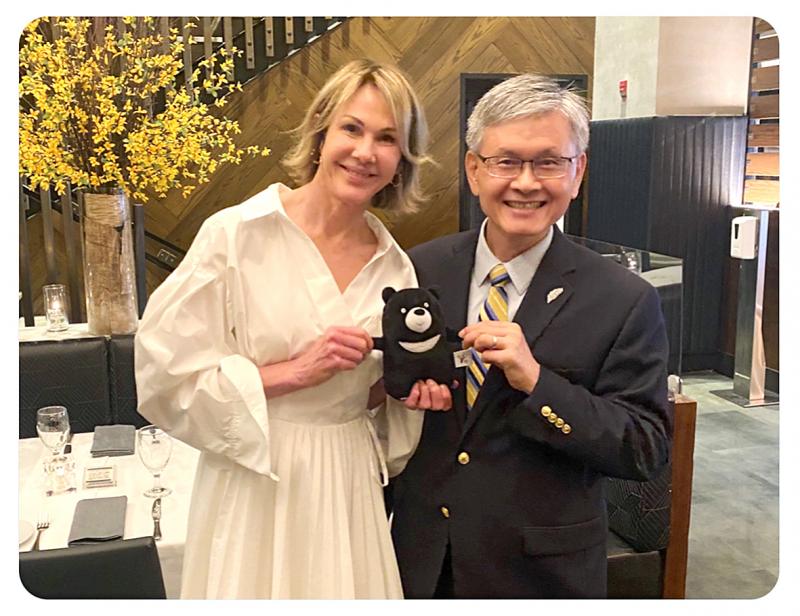Though it has been a well-known fact that China uses the common modus operandi of planting its loyalist nationals in top positions at international organizations to block Taiwan’s membership, the bizarre fact is that attitudes lose their severity once the Chinese nationals leave on completion of their term and are replaced by other nationalities.
A sampling of this distasteful practice can be had at the International Civil Aviation Organization (ICAO), which is the apex international organization for civil aviation. Taiwan has sought membership in the ICAO because it is also a legitimate participant in international air traffic but has been denied access to the organization because the Secretary General of the ICAO was a Chinese official who did everything in his power to bluntly block Taiwan’s attempts to join the ICAO.
Taipei Economic and Cultural Office in New York Director James Lee (李光章) says Taiwan is an important air-travel hub of the region, recording about 50 million passengers annually flying through its airports.

Photo: Manik Mehta
“And yet, Taiwan is not allowed to become a member of the ICAO. Taiwan seeks meaningful participation. Taiwan can benefit from the latest update on technological information of interest to civil aviation, but it can also provide it with the latest breakthroughs in aviation technology and safety standards,” Lee says.
Lee also points to the discrimination by the UN against Taiwanese nationals, who cannot even enter the premises of the world body. The UN, he says, has wrongly interpreted the United Nations General Assembly resolution.
“When Taiwan was a member of the UN Security Council until 1971, it never blocked mainland Chinese passport holders from entering the UN premises,” Lee says.

Photo: Peng Wan-hsin, Taipei Times
However, Lee adds, in 2007 Taiwan passport holders were blocked, most likely, by the UN Secretariat, which had a Chinese Under Secretary General.
“We just want to contribute to the UN to make this world a better place,” Lee says.
‘SALAMI SLICING’
Lee says that Taiwan maintains diplomatic relations with 15 countries; however, the mood worldwide has swung, especially after the COVID-19 pandemic, in favor of Taiwan, with many frowning at China’s pandemic cover-up coupled with its bullying of smaller countries unable or unwilling to stand up to China, which is becoming increasingly aggressive and resorting to what is referred to by diplomats and strategists as the “salami slicing” of others’ lands and violating their sovereignty. Despite not having formal diplomatic ties, 40 countries spoke in favor of giving Taiwan access to the WHO. Indeed, many countries have passed resolutions supporting Taiwan’s WHO membership.
“The pandemic showed that Taiwan is an integral part of the globe. Its exclusion from WHO is detrimental to our interests and also to the world. Even though the WHO rejected Taiwan’s participation in the World Health Assembly, we have seen strong support from the international community. US Secretary of State Anthony Blinken supported Taiwan’s participation in the WHA as an observer. The G-7 countries also spoke in favor of Taiwan and said that Taiwan’s exclusion is not in the interest of the world,” Lee says.
Privately, foreign diplomats accredited with the UN are “not against Taiwan,” as one diplomat put it on the condition of anonymity, and say that many countries, especially the least developed countries, are reluctant to be seen as openly supporting Taiwan because of the trade and economic consequences they would have to face by refusing to toe Beijing’s line.
However, Taiwan has been a member of the WTO since 2002, and of the Asia Pacific Economic Cooperation since 1991; it has also joined the Central American Bank for Economic Integration, the Pacific Economic Cooperation Council and the Pacific Basin Economic Council.
US BIPARTISAN SUPPORT FOR TAIWAN
While bipartisan support for Taiwan has also increased in the US, it has, at the same time, declined for China, particularly after the pandemic outbreak, with many scientists and researchers even suspecting — some politicians have also echoed the suspicion — that the COVID-19 virus may have been unleashed by an intentional or accidental leakage by Chinese scientists working in a Wuhan research laboratory.
Indeed, many representatives of both the Republican and Democratic parties have been calling for expediting the finalization of a free trade deal with Taiwan, referred to as the Trade and Investment Framework Agreement (TIFA).
The US, which has for years emphasized the significance of the Indo-Pacific, could realize its long-term vision for the region by entering into negotiations with Taiwan on a free trade agreement.
Taiwan, for its part, is equally keen to sign the trade agreement with the US. Both sides held virtual talks this year on the TIFA. The talks were revived after former US president Barack Obama left office in 2016 without closing the deal, while the US trade representative Robert Lighthizer, during president Donald Trump’s term, dedicated his attention to China.
Taiwan’s chief negotiator, Minister Without Portfolio John Deng (鄧振中), had conveyed to the US Taiwan’s interest in the TIFA and hoped both sides would sign the agreement very soon. The deal would be a show of US support for Taiwan facing Chinese pressure.
The Biden administration has also reaffirmed its commitment to support Taiwan. A bipartisan group of 42 US senators have already written to President Biden’s US Trade Representative Katherine Tai (戴琪), calling on her to initiate steps to lay the groundwork for negotiating the trade or other preliminary agreement with Taiwan. The senators emphasized that it was essential to maintain US economic influence in the region and reduce Taiwan’s dependence on China with the goal of making the region free and open.
Lee argues that the signing of TIFA would attract investments from Taiwanese companies that are leaving China “and their investments could flow to the US,” adding that Taiwan’s investment flow to the US last year rose by 600 percent over the previous year.
Taiwan has established itself as Asia’s semi-conductor and electronics hub.
“Foreign investors will tell you the advantages Taiwan offers. Taiwan is an important logistics center, a gateway to the ASEAN region and China, providing a strong industrial cluster and IPR safeguards,” Lee says.

Dissident artist Ai Weiwei’s (艾未未) famous return to the People’s Republic of China (PRC) has been overshadowed by the astonishing news of the latest arrests of senior military figures for “corruption,” but it is an interesting piece of news in its own right, though more for what Ai does not understand than for what he does. Ai simply lacks the reflective understanding that the loneliness and isolation he imagines are “European” are simply the joys of life as an expat. That goes both ways: “I love Taiwan!” say many still wet-behind-the-ears expats here, not realizing what they love is being an

Google unveiled an artificial intelligence tool Wednesday that its scientists said would help unravel the mysteries of the human genome — and could one day lead to new treatments for diseases. The deep learning model AlphaGenome was hailed by outside researchers as a “breakthrough” that would let scientists study and even simulate the roots of difficult-to-treat genetic diseases. While the first complete map of the human genome in 2003 “gave us the book of life, reading it remained a challenge,” Pushmeet Kohli, vice president of research at Google DeepMind, told journalists. “We have the text,” he said, which is a sequence of

Every now and then, even hardcore hikers like to sleep in, leave the heavy gear at home and just enjoy a relaxed half-day stroll in the mountains: no cold, no steep uphills, no pressure to walk a certain distance in a day. In the winter, the mild climate and lower elevations of the forests in Taiwan’s far south offer a number of easy escapes like this. A prime example is the river above Mudan Reservoir (牡丹水庫): with shallow water, gentle current, abundant wildlife and a complete lack of tourists, this walk is accessible to nearly everyone but still feels quite remote.

It’s a bold filmmaking choice to have a countdown clock on the screen for most of your movie. In the best-case scenario for a movie like Mercy, in which a Los Angeles detective has to prove his innocence to an artificial intelligence judge within said time limit, it heightens the tension. Who hasn’t gotten sweaty palms in, say, a Mission: Impossible movie when the bomb is ticking down and Tom Cruise still hasn’t cleared the building? Why not just extend it for the duration? Perhaps in a better movie it might have worked. Sadly in Mercy, it’s an ever-present reminder of just